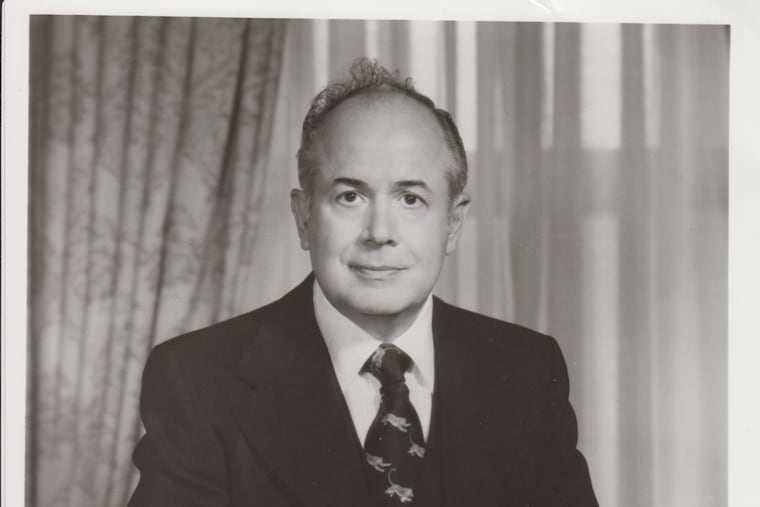Joseph C. Bruno, Common Pleas Court judge in Philadelphia, dies at 96
Judge Bruno was driven, precise, and did not suffer fools gladly, but softened his approach when with family and the child victims who appeared before him in Juvenile Court.

Joseph C. Bruno, 96, a Common Pleas Court judge in Philadelphia for 36 years, died Sunday, Sept. 13, of complications from Parkinson’s disease at his home in Center City.
Judge Bruno was the descendant of a family that came to the United States from Italy in the 1860s. He was born in Philadelphia but moved with his parents to Upper Darby and spent his childhood there.
He graduated from Upper Darby High School in 1942, Temple University with a business degree in 1948, and earned a degree from Temple Law School in 1952. His specialty as a young lawyer was the administration of estates, probate, and corporate law.
He excelled at most things he tackled, said his wife, Kathleen P. Bruno. As a boy of 5, he played the violin. As an adult, he was driven, precise, and did not suffer fools gladly, but softened his approach when with family and for the child victims who appeared in his courtroom.
“He was just a fabulous, fabulous man,” his wife said.
In 1963, he was named chief counsel for the Public Utility Commission by Pennsylvania Gov. William W. Scranton. Five years later, he was appointed to the Common Pleas bench by Gov. Raymond P. Shafer. He stood for election before the voters of Philadelphia in 1969, 1979, and 1989, and then served as a senior judge, retiring in 2004.
He began his judicial career in Juvenile Court at a time when gangs were active in Philadelphia. To learn more about their activities, he rode along with the police Gang Control Unit.
“Turf-related and revenge-based killings occurred almost daily in the neighborhoods,” although drug-related crime was less prevalent, he later told Family Court Reporter, a newsletter of the Family Division of the Philadelphia Court of Common Pleas.
In 1969, amid a push to expand juveniles' legal rights from local defense lawyers, his courtroom became a test case on the constitutional question of a juvenile’s right to a jury trial.
Judge Bruno denied defendant Edward Terry a jury trial, in the adjudicative stage of a state juvenile delinquency proceeding, triggering appeals that went to the U.S. Supreme Court. In 1971, the high court upheld Judge Bruno’s decision.
Twenty of his 36 years on the bench were spent in the Orphans' Court Division, where he dealt with wills, trusts, and estates. Disposition of large sums of money and assets often turned on the testimony of the frail elderly, so he pioneered the practice of holding competency hearings in nursing homes and hospitals.
In 1991, he returned to Juvenile Court, by that time called Family Court, at 1801 Vine St. He presided over an orderly, punctual, quiet courtroom.
Some cases involved child victims. At the start of each session, he announced that all cases with children under age 11 would be heard first. “He didn’t want a child sitting in court all day waiting for this,” his wife said.
To put the youngsters at ease as they testified, he asked them if he could come down from the bench and stand next to them.
“He would put himself down to their level,” his wife said. “He wouldn’t get too close, but his presence helped them to say what happened. He was wonderful with the children.”
In 1975, Judge Bruno married his wife after dating her for six years. There was a 23-year age difference between them, but it didn’t matter. He was youthful and vigorous until a 2019 stroke confined him to his bed.
“He was a great walker,” she said. “He would walk four times around Rittenhouse Square every day after court, for two miles.”
Judge Bruno was a member of the Union League of Philadelphia for 50 years and Rotary International. As governor of the Rotary’s district 744, he and his wife arranged for 40 tons of books to be collected and shipped by boat to schools in Nigeria.
He traveled to Japan, India, Russia, and Thailand and sang with a choral group of fellow patients called the Parkinsingers.
Besides his wife, he is survived by nieces and nephews.
Services were Thursday, Sept. 17, with burial in Arlington Cemetery, Drexel Hill.
Donations may be made to the Salvation Army of Greater Philadelphia, via https://pa.salvationarmy.org/greater-philadelphia/